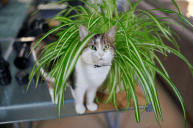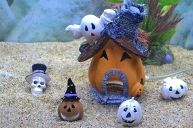It's that time again to deck the halls. But you should be careful when it comes to breaking out your Christmas decorations if you have pets. While they may look festive, they can also be deadly.
Take the fiesty mistletoe for instance. The Christmas decoration is popular among holiday romantics looking to lock lips with that special someone. Hallmark movies have practically conditioned us to the wonders and joys of mistletoe. But the Christmas decoration is a hidden threat for your dogs and cats at home.
"There are some plants that absolutely can be a matter of life and death," Dr. Carol Osborne, of Chagrin Falls Pet Clinic, told Chewy. "Mistletoe berries are super toxic—they can cause a heart attack and even death." She said that the issue was "a matter of life and death." If you're planning to use the decoration, then you need to keep it out of reach of cats and dogs.
Christmas Decorations
Meanwhile, you should also avoid having poinsettias as part of your Christmas decor. Consider getting the plastic plants instead. "We see all these warnings on the internet about poinsettias," the vet said. "The truth of the matter is, most plants might make the animal drool or get a tummy ache or get a little diarrhea, but most plants are not fatal."
It's the white sap of the plant that poses a potential issue. It "contains chemicals similar to those in household detergents." Poinsettias can cause vomiting and diarrhea as well as skin irritation. Consider avoid incorporating lilies into Christmas decorations as well.
"It's important to note that all parts of most types of lilies are very toxic to cats. Homes with cats should never have lilies in them," the American Kennel Club's Chief Veterinary Officer Dr. Jerry Klein said in a blog post. "Amaryllis, balsam, pine, cedar, and holly are among the common holiday plants that can be dangerous and, in some cases, even poisonous to pets who eat them."
If you believe your pet ingested the plant then seek immediate help.
"If you think your pet ingested a toxic plant, don't wait!" Dr. Gary Weitzman, the president and CEO of the San Diego Humane Society, told Chewy. "Plan on visiting your veterinarian or an emergency clinic right away. Call first because your vet might ask you to induce vomiting in your pet."




